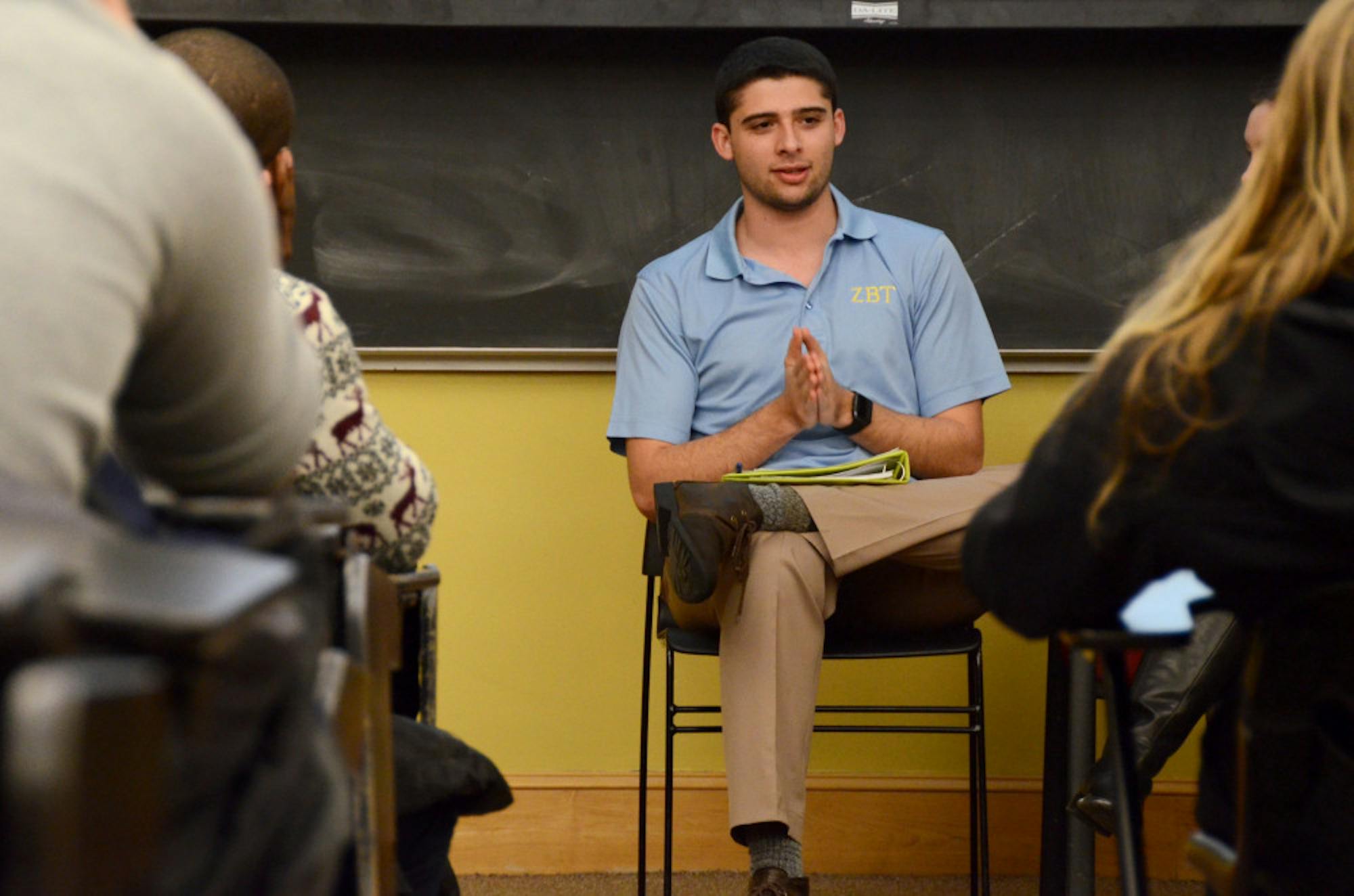At this moment in Tufts’ institutional history, the future of the Greek life system hangs in the balance. According to a message that the Office of the President sent to Tufts students on Feb. 6, the Student Life Review Committeepersists in its evaluation of Tufts' culture and aims to provide “specific, actionable recommendations" for the holistic, long-term reformation of Tufts’ social life.
In his charge to the Student Life Review Committee on Jan. 23, University President Anthony Monaco advised committee members to “consider the changing needs, expectations and demographics of our undergraduate student population, as well as broader national trends.”
Additionally, in his Dec. 22 email to the Tufts community, Monaco expressed that the creation of the Committee was part of a larger movement towards alternatives to Greek life in higher education.
Although the Committee addresses issues specific to Tufts at this particular time, decisions regarding Greek life at Tufts’ peer institutions are also relevant to the committee’s recent efforts to investigate and reform overall social life at Tufts.
Tufts' Peer Institutions
“Students of Tufts, your weekend social lives of partying at fraternities may be in danger. Despite lines stretching from fraternity doorsteps to the streets on weekends and frats reaching full capacity at their sweaty parties, the NESCAC schools have become increasingly willing to phase out Greek life,” Aaron Langerman (LA '15) said in a 2012 Tufts Observer article.
As Langerman’s prediction seems to increasingly reflect the current status of Greek life, Tufts’ students and administrators are looking closely at the university's peer institutions in an effort to create alternative social spaces on campus.
Of Tufts’ 10 peers in the New England Small College Athletic Conference (NESCAC), five -- Amherst, Bowdoin, Williams, Colby and Middlebury Colleges -- have abolished the Greek system entirely, and two -- Connecticut and Bates Colleges -- did not have one to begin with. The remaining three institutions, Wesleyan University, Trinity College and Hamilton College have complicated histories with Greek life. For Wesleyan and Trinity, this includes controversial coed mandates and failed attempts at Greek life abolition.
Wesleyan University directed its fraternities to admit womenin the fall of 2014 following a sexual assault lawsuit filed in 2012. The members of Wesleyan’s Delta Kappa Epsilon (DKE) fraternity sued the school in response to the coed mandate. A 2014 cover story in The Atlantictitled “The Dark Power of Fraternities” drew national attention to the problems with Wesleyan’s fraternities. Wesleyan now has two “coeducational societies,” four fraternities and one sorority.
In the history of Trinity College, there have been two failed coed mandates imposed on Greek life, one in 1995 and the next in 2012.Both were met with opposition from alumni. The assertion that fraternities should be coed was seen as a kind of abolishment because coed fraternities are not recognized by many national organizations, according to a Nov. 30, 2012 Inside Higher Ed article.
The 2012 coed directive was revoked in 2015, when then-President of Trinity College Joanne Berger-Sweeney issued a Sept. 4 message to members of the Trinity College community.
"The coed mandate is unlikely to achieve its intended goal of gender equity. Furthermore, I do not believe that requiring coed membership is the best way to address gender discrimination or to promote inclusiveness," Berger-Sweeney said in the message. "In fact, community-wide dialogue concerning this issue has been divisive and counterproductive."
Northwestern University still has a Greek system and Georgetown University continues to have students in Greek organizations, but suggestions for abolition and reform are not foreign to either school's history.
"We should abolish Greek life at NU, and it wouldn’t be as hard as you think,” Aaron Boxerman said in an Oct. 9 op-ed in Northwestern’s daily newspaper. "Banning fraternities and sororities would not do away with classism and sexism at NU. But it’d be a powerful start. Those students committed to making the world around them a better place should start thinking creatively about what a non-Greek NU campus could look like.”
ThoughGeorgetown University has officially refused to recognize Greek letter organizations since the 1960s, unofficial Greek organizations exist and remain popular among the Georgetown student body, despite continued conflict with some Catholic figures on campus.
Changing Social Life
At Tufts, Su McGlone, director of Fraternity and Sorority Life, emphasized that she has helped confront the divisive controversies surrounding Greek life.
“In my role, I've met with other student life administrators from the NESCAC schools to provide resources and support to each other,” she told the Daily in an email.
McGlone added that she is part of a large network of fraternity and sorority advisors.
The network is “used for gauging best practices and providing support to one another, especially when we see similar issues on our campuses,” she wrote.
Such collaboration and cross-referencing among university administrators is not new. Trinity has looked to Tufts as a model in the past. A 2012 report of Trinity College’s Charter Committee for Building Social Community states that the Charter Committee considered the input of other NESCAC schools in making their decisions to curb the influence of its fraternities and sororities.
"The committee consulted the presidents of Tufts, Wesleyan and Middlebury, as well as the dean of student affairs at Bowdoin and trustees at Hamilton," the report said. “Each of these peer institutions tackled the fraternity and sorority issue slightly differently … Tufts opted for the status quo but worked closely with fraternities to improve their behavior, imposing severe penalties for rule infringements. It also created new major social events open to the entire undergraduate population as a way of reducing the influence of fraternities on the school’s social life.”
In the same report, Trinity looks to the “social houses” of Bowdoin and Middlebury as potential replacements for Greek life.
According to Tufts Community Union (TCU) Senate Diversity and Community Affairs Officer Benya Kraus, members of TCU Senate are "looking at the different social options at our neighboring and peer institutions in an effort to reimagine and reconstruct social life."
Kraus, a junior who serves on the Student Life Review Committee, is in favor of ending the Greek system and replacing it with more inclusive social spaces.
"I think Tufts would be a better place if we didn’t have communities that had all these really exclusive barring of entry," she said.
At the same time, Kraus recognized her role as a senator and the accompanying responsibility to seek out as many voices and opinions on the matter as possible.
"I also think, in order for any decision to take place, it needs to come from the community," Kraus said. "We’re going to face a lot of resistance and hurt from so many different parts of the Tufts community if any decision is ... made without a really thorough process of listening to students."
Correction and clarification: A previous version of this article reported that Hamilton College does not have a Greek system, though it in fact does. The article was further clarified to reflect that while several NESCAC schools have abolished their Greek systems, Connecticut College and Bates College did not have Greek systems in the first place. The Daily regrets these errors.
Greek life abolition at Tufts' peer institutions: What does the future hold?






